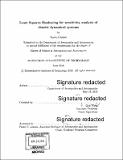Least Squares Shadowing for sensitivity analysis of chaotic dynamical systems
Author(s)
Chater, Mario
DownloadFull printable version (5.611Mb)
Other Contributors
Massachusetts Institute of Technology. Department of Aeronautics and Astronautics.
Advisor
Qiqi Wang.
Terms of use
Metadata
Show full item recordAbstract
In numerous scientific and engineering fields, sensitivity analysis tools are essential for design optimization as well as uncertainty quantification. For instance, adjoint algorithms are common place in aerospace engineering when it comes to optimize the shape of an airfoil, the configuration of a rocket or to quantify the impact of a manufacturing imperfection on the performance of a product. The quantities of interest are long-time averaged outputs such as the average drag on a plane wing. However, these conventional methods fail to compute the right sensitivity when the physical model exhibits chaos. This is the case of many turbulent fluid flows and atmospheric modelisations. A recently developed method, Least Squares Shadowing or simply LSS, tackles this problem and proposes an alternative approach to compute the desired sensitivities. The results are very promising and this thesis is intended to lay the mathematical foundations of this new algorithm. A latter part is dedicated to some improvements of LSS which make it faster and more reliable.
Description
Thesis: S.M., Massachusetts Institute of Technology, Department of Aeronautics and Astronautics, 2016. Cataloged from PDF version of thesis. Includes bibliographical references (pages 85-87).
Date issued
2016Department
Massachusetts Institute of Technology. Department of Aeronautics and AstronauticsPublisher
Massachusetts Institute of Technology
Keywords
Aeronautics and Astronautics.